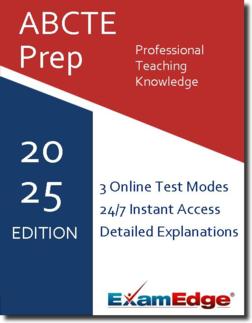ABCTE Professional Teaching Knowledge ( Professional Teaching Knowledge) Practice Tests & Test Prep by Exam Edge - Test Reviews
Based on 29 Reviews
- Real Exam Simulation: Timed questions and matching content build comfort for your ABCTE Professional Teaching Knowledge test day.
- Instant, 24/7 Access: Web-based ABCTE Professional Teaching Knowledge practice exams with no software needed.
- Clear Explanations: Step-by-step answers and explanations for your ABCTE exam to strengthen understanding.
- Boosted Confidence: Reduces anxiety and improves test-taking skills to ace your ABCTE Professional Teaching Knowledge (PTK).

ABCTE Professional Teaching Knowledge ( Professional Teaching Knowledge) Practice Tests & Test Prep by Exam Edge - Review
ABCTE Professional Teaching Knowledge - Reviews
Excellent
Based on
145
reviews
“ Excellent material for studying. Thanks to Exam Edge tests I was able to pass the required ABCTE exams and I got my teaching certificate.
Verona , Bannock County, Idaho
“ Not sure why there are so many world history questions on this history exam. I feel like they are great questions, just on the wrong test. There are 10-15 per test that do not pertain to the US.
Stephanie , Kuna, Idaho
“ Just passed the ABCTE Physics exam with a very strong score. These practice tests are a huge part of the reason. The same was true when I sat for the PRAXIS last Spring. Exam Edge actually works. 100% effective and very reasonably priced. Can't rate it highly enough.
Jeff, Collingswood, NJ
“ The practice test bundle for the ABCTE ELA exam was a dream come true! The Exam Edge practice test questions prepared me for the actual test items, allowing me to successfully pass the exam! You NEED this! Their customer service was also extremely easy to work with and quickly responded to me regard ...
Read More
Nikki , WV
See why our users from 154 countries love us for their exam prep! Including 29 reviews for the ABCTE Professional Teaching Knowledge exam.
Exam Edge is an Industry Leader in Online Test Prep. We work with our Institutional Partners to offer a wide array of practice tests that will help you prepare for your big exam. No Matter how niche field of interest might be, were here to help you prepare for your test day.
| 2.8M | 4.5M | |
| Users | Tests Taken | |
| 100K | 19 | |
| Unique Exams | Years in Business | |


